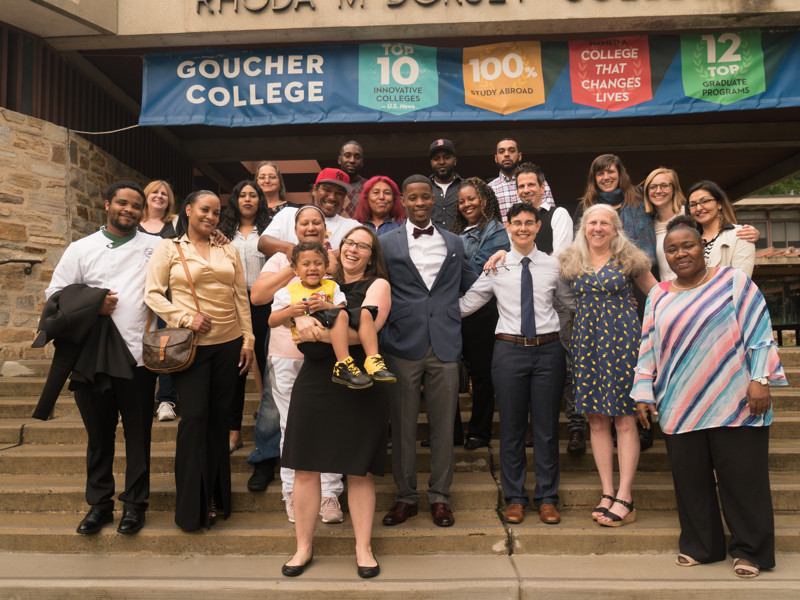I would like to thank all of the people who have supported me on this journey. Of course, my family, and my professors. The GPEP staff , volunteers, research assistants and Goucher’s administration. I also need to thank the people who donate to GPEP, as well as the people who advocate for change in the legal system. We need all of you to make this mission – the mission of Second Chances and First Opportunities– successful.I thank all of you for believing in the benefits of looking for potential in people who have been thrown away.
Six years ago, I could barely spell half of the words I wanted to say. Just four years ago, after my release from prison, I couldn’t figure out how to use an i-phone. But today, I am Goucher College Alumni with a BA in Computer Science and a Minor in Sociology. I’m not saying this to brag, but rather to point out what people are capable of when they are given opportunities as well as second chances.
Looking back, when I graduated from high school, my world view was very narrow. So it wasn’t surprising, when six months later, I started serving time in the Maryland state prison system. I had no one to blame but myself: I made the decision that led me to prison.
While inside, I became desperate to learn something – anything – that could help me transform my life. Most folks don’t fully understand how eager people who are incarcerated want an education. Guys inside want to learn, they want to question, and they to want to change. The unfortunate thing is that oftentimes societal forces don’t allow these transformations to take shape. Before GPEP’s arrival, my personal goal to earn an education seemed far removed and completely unattainable. Not because there was a lack of ability or ambition. But there was a lack of concern for the population I was part of. This population had made mistakes and were accountable for their actions. This population had not been given the tools or opportunities to succeed in the first place.
I remember feeling like I was boxed in with limited options for employment and life experiences. I felt like I was fighting a losing battle over and over again. I knew I was not up to par academically, and I needed to improve those skills to make myself employable. I also understood the impact of being a convicted felon and the barriers that would be imposed on me for the rest of my life. But I didn’t understand how I could get back on track and move forward. Ultimately, being in prison meant that I had given society the ability to ignore my potential and discard me: I could be written off as just another lost cause not worth investing in.
Education showed me that this perception was so wrong.Education showed me the value of my potential and that that potential is worth investing in. I was accepted into [Goucher College through] the Goucher College’s Prison Education Partnership (GPEP), and I began taking college classes that literally changed my life. Through engaging with professors, working with peers, and spending a lot of hours studying, I started growing academically: I learned to think critically, to analyze, to question and to accept the vulnerability that is part of learning new skills. Going forward, I have confidence, a path, and a vision. That is my freedom.
Before GPEP, college was not an option. I didn’t go on college tours. It was not even in the conversation. I got this opportunity through prison, not in my adolescence, not in high school, not in middle school. At MS113, even the 6th graders entered the school by passing through a metal detector every morning. Eleven-year-olds don’t carry guns or knives, but we were treated as if we did.
So, why did I have to go to prison to get an education?
The beauty of a liberal arts education is that it prepares us to answer questions like this. It prepares us to uncover new truths, to question stated assumptions and to boldly approach the complex issues of our day. Higher education is pushing yourself to produce your best work, but also learning to ask for help when you need it. It’s the connections you develop with professors over extended visits to office hours and it’s the friendships you build with fellow students over group projects and conversations in between classes. It’s the support system within Goucher that encourages us to step out of our comfort zone, engage with the unfamiliar, knowing that when we slip, we have a community ready to help us get back up.
Goucher introduced me to a very rewarding part of the human experience that I didn't know existed. Meeting students who are passionate about public service, who volunteer their time, who invest so much of their energy to support something they care about. This has helped me to reevaluate my passions, goals, and how I want to make a contribution to my community.
Thanks to you, I am part of a larger community. I have a deeper call. I am now obsessed with learning and prepared to use that education to fight for what I believe in.
Our mission –the mission of Second Chances– is urgent. We must continue to create opportunities for individuals to empower themselves through education and we much continue to expand who has access to a college education. As all of us are one mistake away from having our freedom taken away. But the flip side of the coin is that we are one opportunity away from transformation.
